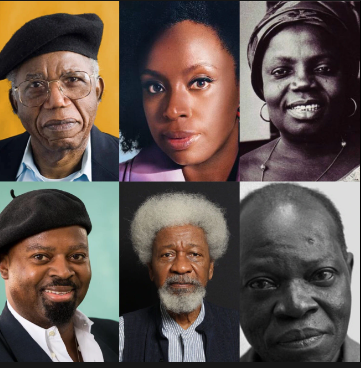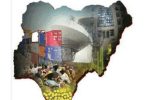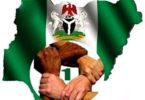Nigeria is conspicuous on the map of Africa not just for its strategic location as a tropical and coastal country. And strangely enough, the country is nearly the focal point of the continent. It marks the inner hinge of the huge region and lies quite unhidden. Call it Africa’s symbolic ‘center of gravity’. Immersed in a swirl of internal struggles that cut across security, multicultural identity, governance, religion, and developmental issues, the country by contrast is undoubtedly rich in human and natural resources. Over the years, the country has gradually grown to become a significant regional (and progressively global) power, but not in political terms. Rather, Nigeria’s influence in African literature and arts is so significant, that it has attained global proportions.
Nigeria has become a foremost cultural ambassador for Africa in the fashion, music, film, and literary arts. It is an achievement, and an accolade worn proudly by any typical Nigerian wherever they find themselves across the world. Some critics have even pointed out the tendency for Nigerians to ‘overachieve’ on the global stage. This is in stark contrast to the challenges they left behind at the homefront. It is therefore no surprise that some of Africa’s most illustrious literary giants – including forerunners in African storytelling – originated from Nigeria.
Nigeria’s Contribution to the Evolution of Modern African Literature
Its highly influential, award-winning literary geniuses attest to Nigeria’s influence in African literature. They helped to define and present both existing and emerging realities in modern Africa through their writings. But the journey into literary artistry and the proper curating and correct interpretation of African history started right in colonial Nigeria. It began long before the celebrated father of African literature, the legendary Chinua Achebe was born. Olaudah Equaino and Ajayi Crowther both returned from European slavery at different times. But they embarked on changing the short-sighted narrative that Africa had no history with their writings and linguistic translations.
Olaudah Equaino was originally of Igbo origin. He returned to his homeland to give written accounts of his capture, travails, and eventually his hard-earned freedom from slavery. His book became a strong narrative, eventually used in the war to challenge the legitimacy and abuses of slavery. Yet again was the case of the Yoruba former slave turned bishop – Ajayi Crowther. Ajayi Crowther was captured in Sierra Leone and sold to slavery. Upon earning his freedom, Crowther returned years later to develop a written form of the Yoruba and Igbo languages. He also prepared translations of the Christian Bible into Yoruba and Igbo languages, in his work to promote the spread of Christianity in southern Nigeria. Crowther was also able to prepare written documentation of the history of the Yoruba people
Fast forward to the late 1950s, when Chinua Achebe published the globally acclaimed historical fiction novel Things Fall Apart. The novel was the first of four powerful novels that shattered previously held misconceptions that Africa lacked wisdom, history, or purpose. The intrusion and desecration imposed upon the continent by colonial Europe notwithstanding, Africans defiantly sought to present their own authentic stories. They sought to take charge of their destinies – regardless of religious indoctrination by foreigners, or Western education.
Achebe pioneered a generation of African writers who yearned to rewrite and present meaningful and authentic narratives of Africa. The great novelist became even more influential during his time as editor of the African Writers Series. He was able to promote the works of several Nigerian and African fiction and non-fiction writers, thus exposing them to a wide global audience. They were encouraged by Achebe to present their people, cultural heritage, thoughts, and struggles to cope with globalization in creative writing.
Meanwhile, the great Yoruba playwright and Nobel laureate, Wole Soyinka, approached African literature from another angle. He proudly presented Yoruba cosmology, wisdom, and traditions side-by-side with those of European nations (such as the Greeks). Soyinka revealed the uncanny similarities and differences between African and European traditions, myths, and worldviews in his plays. Furthermore, he skillfully connected, and even united, the two seemingly diverse worlds of African and European histories. He was hilarious and serious, age-old and experimental all at once.
The Role of Nigerian and African Literature in Shaping the Nollywood Industry
Between Soyinka, Achebe, and the later generations of writers they inspired, their influences went far enough to inspire beautiful storylines in Nigeria’s emerging film industry. Achebe’s Things Fall Apart which won the Margaret Wong Memorial Prize in 1959, was adapted for Nigerian TV screenplay in the 1980s. Global broadcasting giant, British Broadcasting Corporation ranked the novel the 5th of the Top 100 Stories that Shaped the World. The screenplay catapulted the veteran actor and lead character, Pete Edochie to international stardom.
Chimamanda Adichie’s novel Half of a Yellow Sun won international awards and also inspired a Nollywood screen adaptation movie. Soyinka’s plays have also been dramatized on television and in movie theaters. These are some of the noble literary works of African literature that inspired movie scripts for Nigeria’s film industry over the years.
Nigeria has Propelled African Literature to the World
Award-winning literary giants Achebe, Soyinka, and Adichie have a huge readership base in the Western world (especially in the United States). Their works have also been translated into many major languages across the globe. Several other award-winning writers of Nigerian origin have also emerged on the world stage. Typical examples include Ben Okri (first Black winner of the Booker Prize); and Bernadine Evaristo (first Black female winner of the Booker Prize).
Their opinions, oratory, poems, speeches, and interviews have propelled them to one of the foremost thought leaders of the 20th and 21st Centuries respectively. They have influenced global perspectives about race, gender, politics, human rights issues, religion, culture, and other sensitive issues. The prominence of Nigerian literary giants was the subject of a New York Times editorial sometime in 2017.







